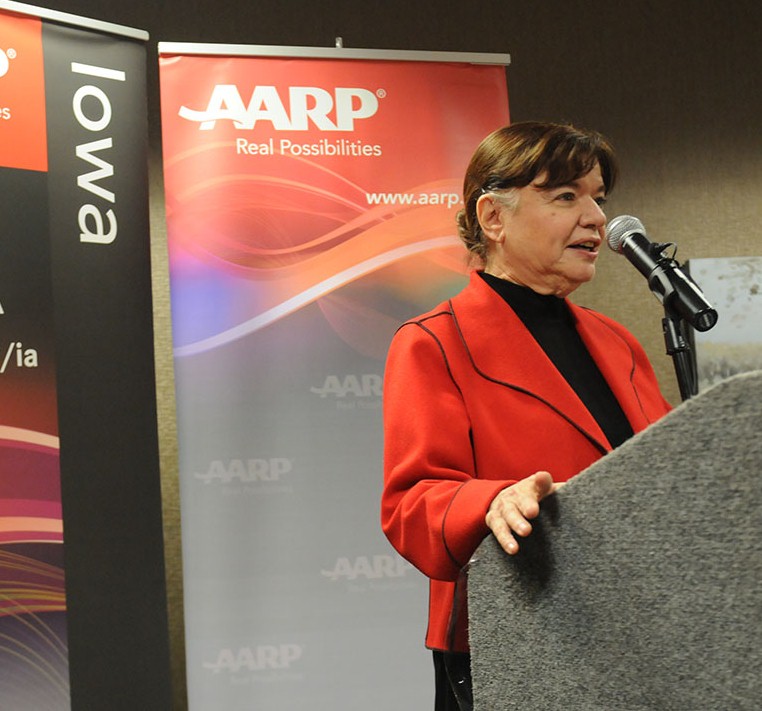AARP Hearing Center

During the 2014 General Assembly, AARP worked with the Iowa Bar Association and other interested groups to secure passage of the Uniform Power of Attorney Act (UPOAA) to help curb the growing problem of elder financial abuse. Senate File 2168 passed both the Iowa Senate and the House unanimously and was signed into law by Governor Terry Branstad effective July 1. This Iowa version of the Uniform Power of Attorney Act (UPOAA) will better protect Iowans against financial exploitation while at the same time make it easier for Iowans to plan for the financial future
“AARP advocated passage of a the Uniform Power of Attorney Act as the most important measure Iowa could use to combat the devastating problem of financial exploitation of elders, and we’re now looking forward to helping Iowans better understand the law so that it can work for them,” said AARP State President Tony Vola.
Specifically objectivse of the new law are:
- to make it easier to create a valid financial Power of Attorney in Iowa.
- to improve acceptance of valid power of attorney.
- to prevent, detect, and redress power of attorney abuse and financial exploitation.
Iowa lawmakers Sen. Rob Hogg (D-Linn) and Rep. Chip Baltimore (R-Boone) were leaders in the General Assembly’s passage of the Iowa’s UPOAA, helping Iowans plan for and protect their financial future.
"The Uniform Power of Attorney Act is a crucial piece of legislation to prevent one of the most common forms of elder abuse - the misuse of a power of attorney,” said Representative Baltimore. “This new law improves how these documents can be used to assist elderly Iowans in managing their financial affairs, but more importantly makes the agent's duties clearer and more defined. In doing so, the law better protects Iowans from those who wish to take advantage of them."
"One of the important functions of government is to protect vulnerable people from fraud and abuse," Senator Hogg said. "This law helps do that by imposing specific duties on agents and giving enforcement powers to relatives and others who have an interest in protecting vulnerable people from financial exploitation."
A financial power of attorney is a legal document that allows someone to make decisions on behalf of someone else. A power of attorney document can be a useful tool in the event of future incapacity and can avoid the need for court appointment of a guardian or conservator. But power of attorney misuse and abuse can lead to dire consequences for the person it was meant to benefit.
“Choosing an agent in a financial power of attorney to represent you if you become unable to manage your finances is one of the most important decisions you can make for your future years,” said Professor Josephine Gittler, director of the National Health Law and Policy Resource Center of the University of Iowa College of Law. “Understanding what a financial power of attorney is, how to choose someone to serve as your agent, what their powers are and how to create a POA are key considerations our on-line information addresses in layman’s terms.”
Although drastically under-

reported, the illegal use of an elder’s income or assets has become an increasingly common crime in Iowa and across the country. Multiple national studies find financial exploitation of seniors is the most common type of elder abuse, estimating one of every six adults over the age of 65 has been a victim of elder financial abuse. Women are twice as likely as men to be the victims, especially those who live alone and require assistance with health care or other “activities of daily living.”
“AARP Iowa is pleased to be working with the National Health Law and Policy Resource Center to help Iowans better understand both the need to establish a financial power of attorney and how Iowa’s new UPOAA will give older Iowans and their families greater peace of mind with the assurance of stronger protections against financial abuse and exploitation,” said Vola.
A new, Frequently Asked Questions brochure that was created by AARP and the National Health Law Policy Resource Center of the University of Iowa College of Law, is available to review on line here and the Iowa Statutory Power of Attorney form is available on-line at http://blogs.law.uiowa.edu/nhlp/ . Request copies of both by emailing or calling the AARP Iowa State Office. The AARP Iowa State Office email address is iaaarp@aarp.org; the toll-free number is 1-866-554-5378.
In addition to the on-line resources, AARP will be meeting with Iowa members and the public in communities across the state to distribute the information, as well as reaching to statewide news media outlets to help Iowans better understand the issue, the new law, and what steps they should take to protect themselves and their families against current and future financial power of attorney abuse.
# # #































































